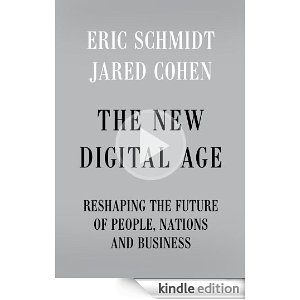Over the past few years, I’ve been talking to SEO guys about social media’s impact on search. They tend have these assumptions.
- If you find the right algorithm you can beat search engines
- Social media is just another system to learn and program for
- Coding beats talking to people

PreOrder “The New Age of Digital” Now on Amazon.
I explain that any human being would rather buy from someone that they know, like, and trust and nothing in optimization theories allows for people doing what they want. Eric Schmidt agrees
“Within search results, information tied to verified online profiles will be ranked higher than content without such verification, which will result in most users naturally clicking on the top (verified) results. The true cost of remaining anonymous, then, might be irrelevance.”
It is profitable to follow what Google says.
They don’t owe me a rank in their search engine or the visitors I get from them, and they have a lot more genius working to give relevant results than any huskter with a system for beating the algorithms
Social Media Impact on Search – What it means to you
In 2011, Google started pushing authorship, a way to tag posts that identified the human that wrote it. Since then I’ve seen SEO jocks go through what looks like the five steps.. ignoring this, denying it will affecting them, fighing it, bargaining, and finally accepting that their days are numbered.
When we heard about a TIME social media editor using social media for an old media property, our first thought was “Won’t this just be #oldmediabias talking about what they are doing to get people back to ‘the way things should be”

In this Ebyline interview of social media editor Kelly Conniff by Susan Johnson, we see there’s more to it than that. Still, we have the paradox: the better she does at embracing the future, the harder it will be for TIME to pretend they can hold to the past?
Is there a future for magazine? Read this and let’s discuss in the comments below.
When news breaks, readers turn to social media to read and post updates, presenting opportunities for news outlets to engage with them and challenges in keeping up with multiple platforms and a 24/7 news cycle. Ebyline recently discussed these challenges and opportunities with Kelly Conniff, who started as social media editor at TIME in September after working as social media manager at the National Geographic Society since 2009. Excerpts from that interview follow.
What social media platforms does TIME focus on?
Really the number one platform we’re on is definitely Twitter. We actually just hit four million followers today, which was amazing. Beyond that we also are on Facebook, and we just actually hit 600,000 [Facebook likes]. We’re one of the biggest news ands on Google +, and we should be in the neighborhood of hitting two million next week, which is just amazing.
We’re also on Pinterest and Instagram. We actually have two Tumblr’s. One is TIME magazine proper, and it’s very much kind of our behind-the-scenes look at how the magazine is made, how we put together our amazing covers, and basically how we do what we do. We also have one for LightBox, which is our photography blog that is very popular in the industry. That one focuses a little bit more on the photo projects that we feature every day as well as kind of promoting what’s happening in the photography community.
See full story on ebyline.biz
Social media has a great deal to do with businesses these days and it is important to have a strong social media campaign. In addition to this, costs are minimal, in fact free. As an example we shall look at it is an ideal way to promote an online casino and attract new customers as well as engaging with existing ones in order to develop increased amounts of customer loyalty. Many sites from the UK to online casinos in New Zealand have utilised these tactics, and with such a wide target audience the campaign must be streamlined very well.
Today there is a plethora of alternative social media sites, however the best ones for promoting an online casino business tend to be the tried and trusted ones, which are in order of importance, Facebook, Twitter, YouTube and LinkedIn, which is more a professional network on which many people use for career connections. It is true that the younger generation are rapidly abandoning Facebook for alternative social media, the reason being that their parents are also using Facebook, but that isn’t the important generation to target in order to promote an online casino – their parents are remaining faithful to Facebook and it their parents who you want to play.
There is a saying, which is really nowadays a cliché, the content is King, but it is still as true as it ever was. The fundamental point about promoting an online casino such as through social media is to serve up information that members of the network will wish to share, that way your audience can grow at a potentially exponential rate, so it is essential to get your content right.
However don’t underestimate the dangers. Social media is great for promoting, but it can also have the reverse effect. It is also an ideal way for disenchanted customers to say bad things about you in order to do harm to your reputation and brand. However the effect of this is balanced in your favour as long as you have enough fans who like you. Disenchanted customers who like to flame your reputation will soon be silenced by the majority of fans who continue to like you; it is the way social media works. No longer does one bad apple cause the rest of the barrel to rot.


Last night on Facebook, Robert Scoble asked if people thought that company reps and fans were cluttering up the marketing technology landscape with too many people saying the same thing.
I said the problem was not consumers, it was the company stuck in the paradigm that they had to be talking about their new products.
I’ve been saying:
If you’re the only one saying how awesome your product is, you don’t need to yell louder. tweet this
It’s a topic I’ve been YELLING about (irony is not lost on me) since we wrote Twitter Revolution.
We recognized that we were leaving the anomaly of the 20th century, the mass media one way blasts, and were having two way conversations. I’ve been saying how we spent the last hundred years getting good at pushing out a message, and that now we needed this Century to teach (or have die off) all the people who assume LOUDER is better.
Since then, I’ve learned that dialog is just one step.
OLD MARKETING = One Way Blast from the Center
SOCIAL MEDIA = Two Way.. LISTENING
SUCCESS = Two customers talking to each other.
Your Job is Help Customers Talk to Each Other
Its Word of Mouth and Social Graph and the move to LISTENING put together with a huge amount of data. Working toward knowing the needs of influencers and ALL to anticipate their needs and see that it’s available WHEN THEY ASK FOR IT.
We used to craft marketing messages and announcements. MOST marketers think that’s what social media does: just another media (they are the ones going away over the next 100 years :).
The marketing technology landscape has evolved. The business of the future will have smart relationships, use all the data they can mine, wisdom and insight to design better products and then let the market find them.
Marketing is Seduction
Like any seduction, marketing that looks like marketing is third rate marketing. We don’t chase the one who is chasing us. The ART of this is knowing that people are anxious for your new products, your excellent service and your fresh ideas. More important, they are dying to tell their friends that they found the newest thing.. not parrot what we tell them.

We were discussing social media ROI (return on investment) and how to calculate the profits from social media.
After blurting out my standard line:
We got into a serious discussion about the balance between asking for attention/sales and building real relationships that are far more profitable over time.
Is Asking for Social Media ROI Selfish?
This goes back to one of my most basic philosophies. The most selfish thing you can do in life is to be selfless.
Talk about a counter-intuitive headspin… Once you know that selfless is the best for your own interests, you realize that trying to ACT selfless is selfish. You have to BE selfless.. that is, you want to get to the point where you put your self interest on the back burner and think about it less and less.
Easier said than done.
Applied to marketing, we know that marketing that looks like marketing is 3rd rate marketing. Everyone has a BS filter and some people will attack you just because you have something for sale. (ignore them).
Mike Hill is a glowing example of getting it right. He runs a private group on Facebook with the best peer to peer advice around and hardly anyone gaming the discussion for lead generation or traffic (Imagine how crazy promotional a group of Internet promoters could be if they were all trying to sell to each other).
Mike set up strong rules against self promotion works hard work to police posts, he’s got a pitch free zone. When he posts or comments, it’s high level helpful advice. You’d really have to dig to even find out what he sells.
This is the best marketing Mike could do. If you ask him about the ROI on the group, I’d imagine his first response would be “Huh?” The thought of capturing an audience to push products to appears to completely missing from his motivations. I haven’t seen sales data for Mike, but know he continues to do well.
How much would Mike attribute to his social media efforts? Hard to say. It’s just part of who he is, and that’s what his customers are buying.
We have to calculate what works, even if our pure intent is to serve others we want it to be effective. All the influence and strategy serves that.
I study the tools, use them for profit, but now I’m learning to limit even the language of IM (ie. traffic, eyeballs, “killing it”) and speak in terms of how I might love my readers and customers more. I don’t just rely on what feels good. I know that my feelings could lead me to waste time in some places and ignore other in pursuit of short term advantages.
Being aware of this takes me back to the paradox of selfless/selfish which I now define as a life mission. We can measure the transactions and assign values to find out what works best, but we prosper more when we act in the interest of our network.
Using this metric, what’s your social media ROI?





